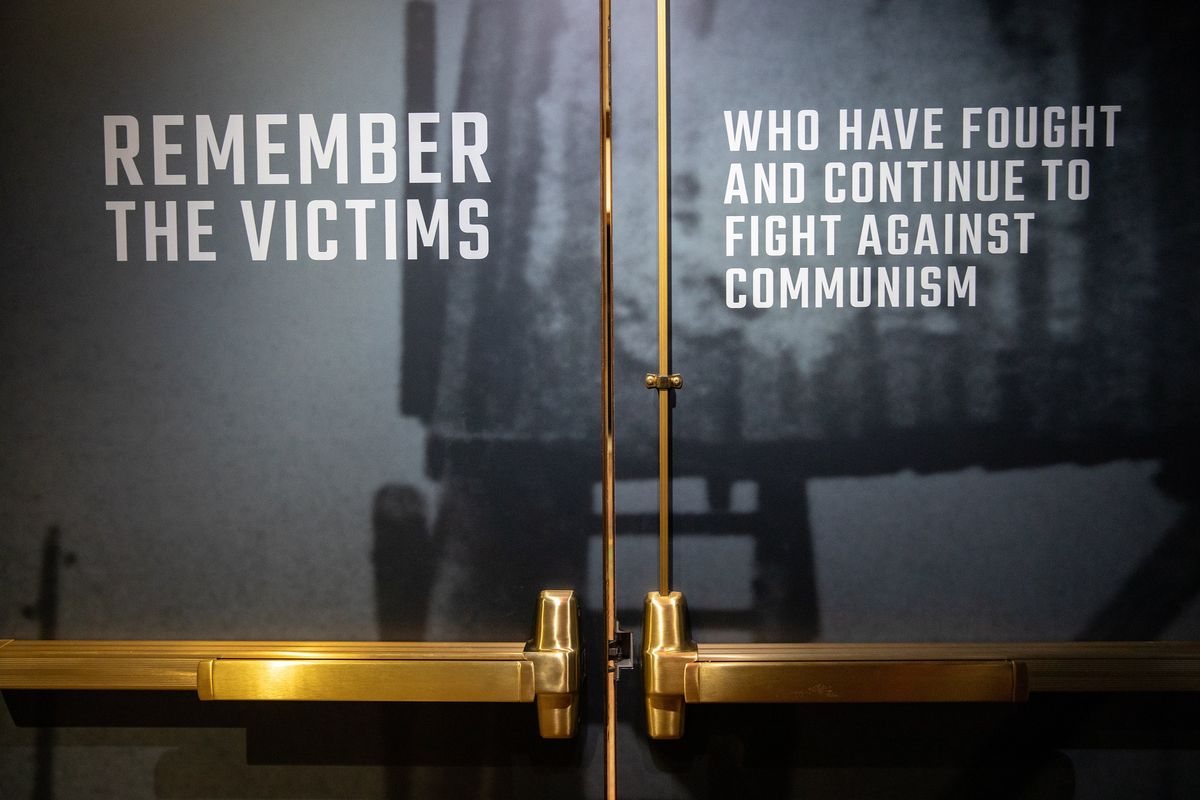 Amanda Andrade-Rhoades for The Washington Post
Amanda Andrade-Rhoades for The Washington Post
Laux was sent to a reeducation camp and was tortured, raped and starved. She eventually reached the United States as a refugee with no English skills, studied to be an engineer, wrote a memoir, and now runs a Cambodian restaurant and food business in San Jose. "If you think that capitalism is bad," she says, "wait until you live under communism."
Today, Laux is a volunteer speaker affiliated with the Victims of Communism Museum, which opened in June in downtown D.C. The modest-size museum is housed in an office building once owned by the anti-communist United Mine Workers of America. It is run by the Victims of Communism Memorial Foundation - established by bipartisan legislation signed by President Bill Clinton in 1993 - and relies on donations, not tax dollars.
Focused mostly on 20th-century atrocities, the museum details the evolution of communism from Marx to Soviet Russia to other governments around the world, estimating that communist regimes inflicted 100 million deaths worldwide, including lives claimed by executions and famine.
Bleak canvases by Ukrainian painter Nikolai Getman - who turned his Siberian gulag years into art - adorn the walls. An interactive display allows visitors to choose what they would do if facing persecution by Fidel Castro and other dictators. A photo gallery of those who survived communism includes Aleksandr Solzhenitsyn, Pope John Paul II and the Dalai Lama. A merchandise table near the front door sells anti-Che Guevara shirts; the face of Cuba's revolutionary hero, often found on dorm room walls, is encircled in red with a line through it.
On the second floor, a temporary collection focuses on the Tiananmen Square protest in China in 1989, which ended with the murder of hundreds if not thousands of pro-democracy dissidents. One of the protesters' iconic blue tents is on display, as are the bloody shirt of a journalist beaten by soldiers and a flag flown at the protest bearing more than 90 inscriptions.
The museum aspires to be more than a catalogue of horrors. Andrew Bremberg, president of the Victims of Communism Memorial Foundation, sees the museum becoming a center of scholarship like the U.S. Holocaust Memorial Museum. It has published leaked documents detailing repressive tactics of Chinese police, and in July hosted Olena Zelenska, the first lady of Ukraine.
Bremberg, 43, says young people are not fully aware of the dangers of communism because of misguided predictions that the ideology had no future after the fall of the Soviet Union.
Now, especially given the rise of left-wing regimes in Latin America, he argues that the threat is returning. "This is a huge challenge that has come back," Bremberg told me. "The entire country needs to be more aware of the danger and evils of communism."
In the United States, however, unpacking the history of communism - an ideology associated with John Reed, Woody Guthrie, Isadora Duncan, J. Robert Oppenheimer, Paul Robeson, Lucille Ball, the Hollywood 10 and Rage Against the Machine - gets complicated quickly.
This philosophy that killed tens of millions also inspired generations of activists. Roberta Wood, 73, joined the U.S. Communist Party in 1969.
At the time, the nation was in the throes of the Vietnam War, mired in persistent segregation, and awash in revolutionary rhetoric among youth.
The daughter of a steelworker, Wood was no hippie; she just wanted to join the labor movement. She moved to Chicago to work for U.S. Steel and later became a mechanic in Chicago's sewage treatment plants. In retirement, she became the labor editor at a Communist Party-affiliated newspaper. Now the grandmother of eight children, she's a party spokesperson. It has been, she told me recently, "a really wonderful life."
Wood says communists are "against the victimization of anyone under any system." "I can't defend everything that's been done in the past century-and-a-half in the name of communism. ... Humans are always going to make mistakes," she argues. Wood has never been to the museum, but, "judging from its website," she says, "this museum could be the basis of a whole other museum called 'Lies About Communism.' "
It's easy to see a rightward tilt in the museum's leadership. The foundation's chairman, Edwin J. Feulner, is the founder of the Heritage Foundation; Bremberg is a former domestic adviser to President Donald Trump, who also appointed him U.S. ambassador to the United Nations in Geneva.
Still, opposition to human rights abuses by communist regimes has historically crossed party lines. The Victims of Communism congressional caucus - which supports the general cause of the museum - was founded by two Democrats and two Republicans. And politicians from both parties can be found on the same side of many contemporary issues connected to the museum - for instance, the ongoing treatment by the Chinese government of the country's Muslim Uyghur minority.
One of the volunteer speakers associated with the museum is Rushan Abbas, who is Uyghur and was born in East Turkestan - otherwise known as the Xinjiang Uyghur Autonomous Region of China - in 1967. Among her earliest memories is her mother being taken away by Red Guards; both her mother and father were forced into reeducation during Mao's Cultural Revolution. The family was eventually reunited, but Abbas's father worried enough about Rushan's participation in anti-communist protests in the 1980s ahead of the Tiananmen massacre to arrange for her to study in the United States.
Now the executive director of an organization fighting to end China's genocide against Uyghurs, Abbas, who told me her sister is currently imprisoned by Chinese authorities on false charges, works to bring international attention to Chinese human rights abuses. "I am very much a critic of all communism," she says. "A hopeful idea failed."


 Contact The Editor
Contact The Editor
 Articles By This Author
Articles By This Author